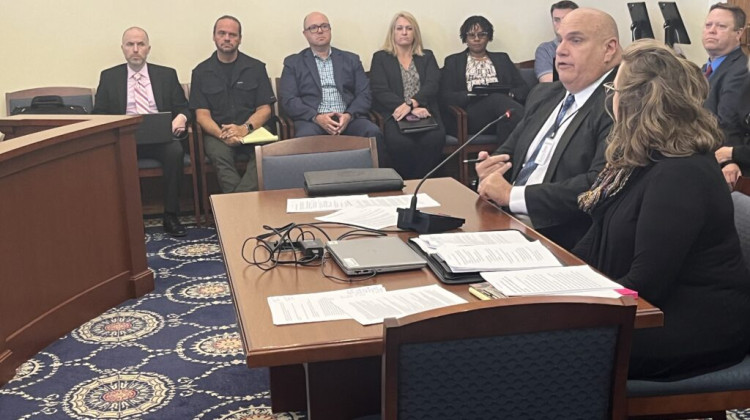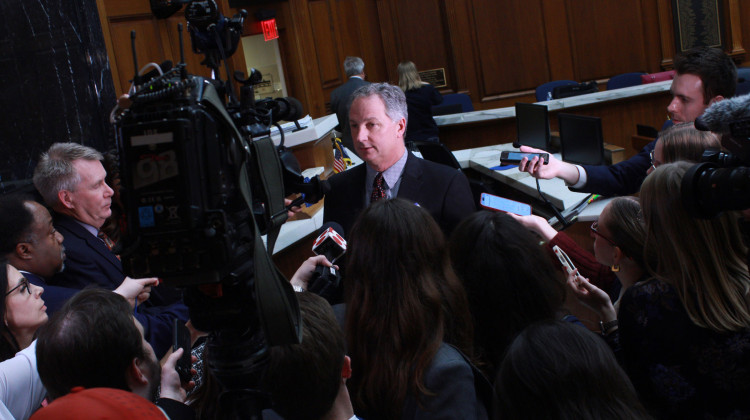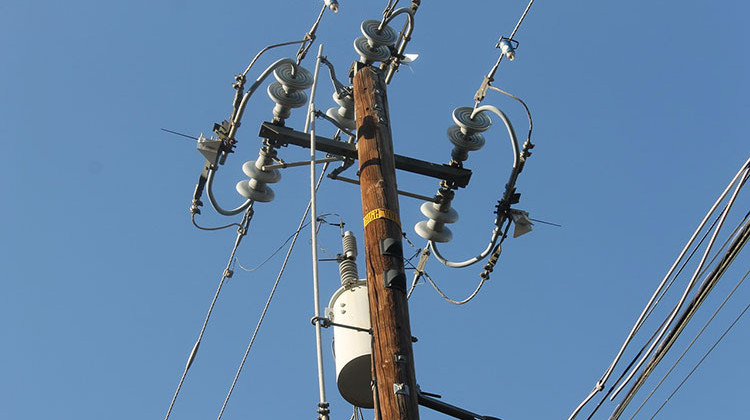
Paul Joyce, the Indiana State Examiner, oversees the activities of the State Board of Accounts (SBOA).
Whitney Downard/Indiana Capital Chronicle
by Whitney Downard, Indiana Capital Chronicle
The influx of billions of dollars in federal relief funneled through the state to Indiana’s counties, cities and townships has increased the workload for the State Board of Accounts (SBOA) by 30%, as the entity audits local budgets and implements federal spending requirements.
“Lots of communities are kind of ‘sitting on their money.’ They’re not spending it all on one place,” said Kendra Leatherman, the general counsel for the SBOA. “They are taking a more budgeted approach to what they’re doing and because of that, we don’t anticipate that (30%) increase to go away until probably after (Fiscal Year) 2027.”
SBOA is tasked with auditing local government’s finances at a cost that cannot exceed 80% of the market rate, or roughly $262 per hour. The agency reported its full cost rate to be $129 per hour, or 49% of the market rate in the last year.
The department presented its annual report before the Legislative Council’s Auditing and Financial Reporting Subcommittee on Thursday, detailing its traditional duties alongside its added workload from federal dollars and proposals for future legislative action.
The trouble with federal dollars
Communities receiving funds from either the CARES Act, the American Rescue Plan Act (ARPA) or the Bipartisan Infrastructure Law have until the end of 2026 to spend all of the funds, though various accounts have earlier deadlines.
Cris Johnston, the director of the Office of Management and Budget, noted that each pot of money had different missions for their dollars.
“The CARES Act was really looking in the rearview mirror, covering your cost of fighting the pandemic. It’s pretty easy to identify a cost that you incur,” Johnston said. “The ARPA and infrastructure dollars that came into the local units, you’re looking forward.”
Many, especially smaller municipalities, may not be familiar with a more forward-looking federal spending plan.
“A lot of times, in order to meet these federal guidelines, you have to put a plan together, submit it to the federal awarding agency and get them to sign off on that. Then you’ve got all of the terms that go behind that as well,” Johnston said. “It’s a much more protracted planning process and execution process than it appears.”
He said the latter may be why many municipalities are still carrying large balances. Additionally, the SBOA doesn’t start the auditing process until someone has spent more than $750,000 — though that bar could increase to $1 million, based on federal regulations.
One of the problems several municipalities had encountered, Leatherman said, is not knowing the different procurement laws required when spending federal funds. Additionally, some units aren’t checking to see whether their contractors have been suspended by the federal government and are thus ineligible for those dollars.
“That’s pretty common; also, it’s pretty easy to check,” Leatherman said.
Traditional SBOA duties
In years where SBOA doesn’t check billions in federal spending, it audits local units of government at least once every four years — though school corporations are audited every other year.
As part of their annual report before the Legislative Council, SBOA detailed the various entities who had faltered in their financial reporting or were noncompliant and potentially failed to make corrective actions.
Paul Joyce, the State Examiner, told the committee that municipalities have an opportunity to make a correction themselves before receiving a state notice. He said that repeated mistakes not only hurt their finances but also take valuable state resources.
“There’s times in the past where we wrote (the same thing) 13 times in a row … it’s a real waste of time to go back and write the same thing up all the time but you get no results,” Joyce said.
Twenty-five entities had no submitted corrective action plan — though their local officials had met with SBOA about the repeat findings — and an additional 63 had issues appearing in three or more public reports. Hundreds of other units had demonstrated progress.
SBOA asked the committee to place additional, public pressure on these entities to address their books in the form of a written letter. But lawmakers noted violations ranged from minor issues of internal records on bank reconciliations to more serious issues such as overdrawn cash balances.
“If this doesn’t work, then let’s have a discussion about what’s that next step. Because at some point in time … we’ll need bank records; we’ll need internal controls,” Joyce said.
Whether it’s complying with federal requirements for funds or tidying the books, Joyce and Leatherman repeatedly said that SBOA has those resources and training available to municipalities — but not everyone took them up on that offer.
Planning for the 2023 session
With the legislative session just months away, SBOA introduced a handful of proposals for lawmakers to consider in preparation — including small tweaks such as requiring county auditors to report their attendance at mandated state trainings.
Bigger changes include designating some of their employees involved in fraud investigations as part of a ‘Criminal Justice Agency,’ a label that allows those auditors access to certain law enforcement databases during the course of their investigation.
Additionally, the department wants to codify what audits are shielded from the public, such as internal risk assessments.
“For anyone that works in the private sector, everyone knows that internal audits are confidential. They’re supposed to be for management … for decision-making,” said Leatherman. “They’re not supposed to be out there for everyone … (but) because we work in government, there’s a little bit of a question on how far that confidentiality goes.”
Lastly, Leatherman said several local officials had been accused and held civilly accountable for using their office to supplement their incomes, which in turn inflates their state pensions. Nothing bars that person from running again for office and, additionally, SBOA can’t clawback the inflated pensions, meaning that the individual continues to earn money from the state.
Leatherman proposed lawmakers consider a fix that would recognize this theft of public property, which can also include non-monetary benefits.
 DONATE
DONATE








 Support WFYI. We can't do it without you.
Support WFYI. We can't do it without you.